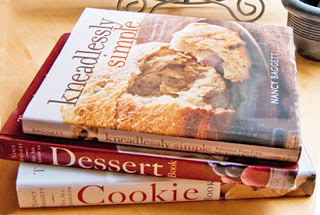 If you’ve ever yearned to write a cookbook, understanding what editors do and don’t want is a great place to start. Such insights will help you get off on the right foot whether in a chance networking opportunity at a culinary conference or in a cover letter and proposal sent to the editor’s office.
If you’ve ever yearned to write a cookbook, understanding what editors do and don’t want is a great place to start. Such insights will help you get off on the right foot whether in a chance networking opportunity at a culinary conference or in a cover letter and proposal sent to the editor’s office.Listen carefully, take heed, and be receptive (never offended) if the editor has any negative reactions to your idea. If, for example, he or she comments that, “Yes, Italian cookbooks are still selling well, but I’m wondering how much fresh territory is still there to be explored,” then be sure you make a strong case in your proposal that what you plan to do is new. Sometimes, responding effectively to such criticism can actually change a no to a yes, as I relate in “Food Writing Lessons I Learned the Hard Way.” One great piece of advice from Lorena applies whenever you work with an editor: “Apply what you learn as you learn it to everything you write.”
Other posts you may like: “Five Things NEVER to Say to a Food Editor.”

Absolutely right–and it sounds like you've succeeded BECAUSE you've done it absolutely right and behaved like a consummate pro.
Nancy,
This post is spot on, and I couldn't agree more about developing a great relationship with your publisher (as in delivering the goods on time, in the right format etc…. I honestly feel that I scored my second book with my current publisher because of this reason. It's hard, very time consuming work, but once you set the stage and establish yourself as a writer who can be trusted to, not only finish the manuscript on time and make it great (without whining!) and be also be genuinely excited about the marketing end of it, you've spoken volumes about your professionalism.
Kendra
Thanks, Jamie. I suppose it seems very mysterious until the editors lay out where they are coming from. I think they covered the basics very well.
Excellent post, Nancy, full of great and useful information for those of us putting together a proposal, even if not strictly a cookbook. Thanks very much!
I had no idea where to begin. Now I do–thanks.
Dana, I'm delighted to hear you found some of my posts of interest. I try to share what I think will be helpful. Do drop by again–and feel free to mention Kitchenlane to your friends also!
Great post. Thank you very much!! btw, came here from Twitter. First time I've seen your site and I've spent much time 🙂
Domenica and Nancie, I know that you are both pros so there isn't any startling news for you here. But reminders are nice once in a while. I loved Lorena's advice to "always apply what you learn as soon as you learn it to everything you write." That's worth reciting everyday!
Such a worthy post. Just what I needed to read right now. Some of these points are familiar, but you've 'cooked it down' to its practical essence. And I've learned some new things as well. I love visiting you here on 'Kitchenlane'!
Thank you for sharing Lorena's and Justin's insights, and your own, too, Nancy. Lots of good information here, for unpublished and published authors alike.
Thanks for commenting. It's very hard to hear criticism of what you're passionate about, but the editor is really doing you a favor. Then you have at least a chance of fixing the problem, rather than just wondering what you did wrong. Actually, I've found that eds generally don't bother dispensing such info unless they really feel the idea has a chance. So always take such remarks as a good sign!
I realize that I did something wrong–I got upset when an editor said something critucal. Now I know I could have used it to help myself. Thank you.
Thanks, Tinky, everything they said rang true to me. I'm glad you found their comments helpful and wish you much luck on your proposal.
As always, you know what you're talking about, Nancy. I'll be sending out a new proposal soon (I hope!) so this couldn't be more timely. Thanks!